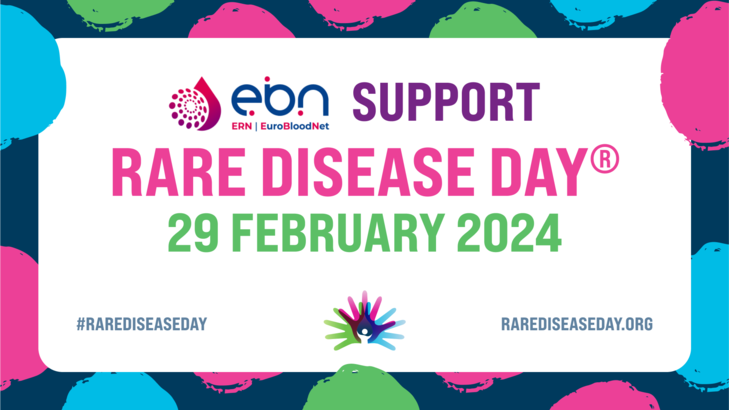The ERN-EuroBloodNet shines a light for rare diseases every day of the year

Working for more than 5 years to improve the lives of people living with rare hematological diseases!
ERN-EuroBloodNet has succeeded during the first years of activity in establishing the EU landscape on rare hematological diseases (RHDs), identifying gaps and needs with relevant stakeholders in the field of RHDs, while avoiding the duplication of efforts and promoting concrete disease-specific actions, with a clear focus on very rare RHDs.
Overall, ERN-EuroBloodNet has carried out well-defined strategies leading to the development of a solid matrix of cross-border health, best practices, education, telemedicine, registries, and research actions. The frame of the new EU4Health Programme (started on October 2023) sets the basis to evolve towards strengthening the health systems in RHDs contributing to:
- Improve the use and re-use of RHD health data for the provision of healthcare, and for research and innovation while promoting the digital transformation of healthcare systems,
- Enhance access to quality and patient-centered RHD healthcare and related care services,
- Support integrated work among MS and health systems, in particular, strengthening and scaling up networking with other ERNs and other transnational networks.
The present period ensures support for the functioning of ERNs, and their better integration into national health systems for the period from October 2023 to September 2027.
Since 2017, ERN-EuroBloodNet has concentrated multidisciplinary teams and highly specialized procedures across EU-MS to advance in the following fields of action. Discover in detail each one of them by clicking on each title!
- Cross-border health: Equal access to highly specialized outcome-based and cross-border healthcare for RHD in EU
- Best practices: Best practices in prevention, diagnosis, and clinical care across the EU by the development and update of ERN Clinical Practice Guidelines (CPG) and other Clinical Decision Support tools (CDST)
- Continuous medical education: Promoting cutting-edge knowledge and continuing medical education in the field of RHDs
- Telemedicine: Inter-professional consultation of RHD complex cases by sharing of expertise and safe exchange of clinical information through the Clinical Patient Management System (CPMS)
- Registries and clinical research: Re-use of RHD health data for the provision of best healthcare and the promotion of research and innovation
The work is focused on more than 450 RHDs according to ORPHANET classification encompassing oncological and non-oncological diseases, of inherited or acquired origin, with acute and/or chronic clinical manifestations, and prevalences ranging from 1/2.000 to 1/100.000.000 individuals.
All the achievements are thanks to the efforts of our collaborators who help us to improve the lives of people living with rare hematological diseases, among them, 97 HCPs in 24 Member States (MS); 90 Members in 18 MS and 7 Affiliated partners (AP) in 6 MS, and 11 European Patient Advocacy Groups (ePAGs) affiliated with 19 different International or European Patients Networks and EURORDIS.
Long live to ERN-EuroBloodNet!
